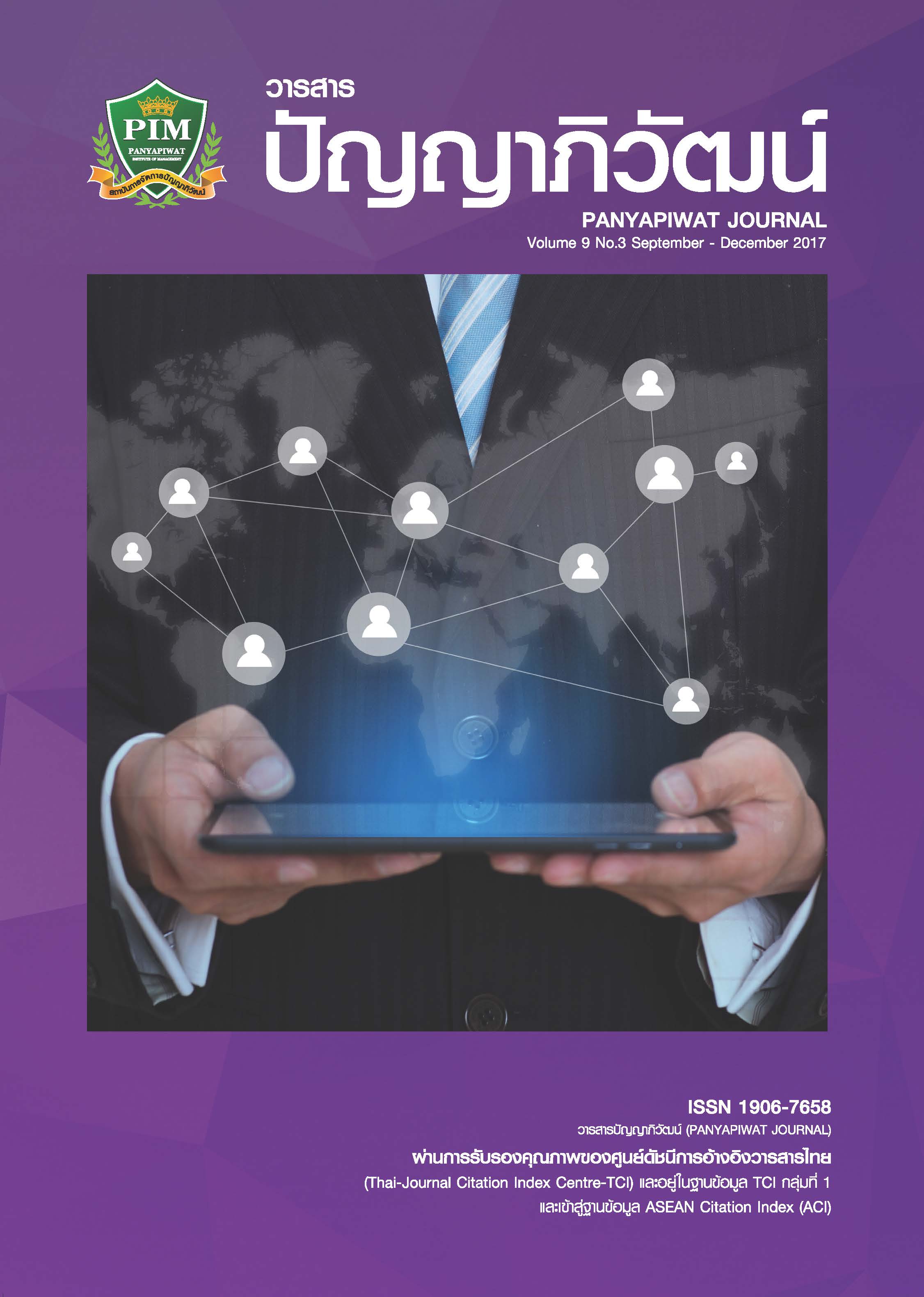คุณธรรมนำชาติพัฒนาจากนิวซีแลนด์สู่ไทยแลนด์
Main Article Content
บทคัดย่อ
คุณธรรมจริยธรรมเปรียบเสมือนคุณงามความดีในจิตใจ สังคมผู้ที่มีคุณธรรมอยู่เป็นจำนวนมาก สังคมนั้นย่อมอยู่ร่วมกันอย่างสันติสุข ประเทศนิวซีแลนด์เป็นประเทศหนึ่งที่ประสบความสำเร็จในการจัดการศึกษาที่สามารถสร้างคนให้มีคุณภาพและมีรูปแบบการพัฒนาคุณธรรมที่เกิดจากการร่วมมือของระบบวัฒนธรรมที่เข้มแข็ง ที่เรียกว่า “แก่นค่านิยม” ที่มาจากสถาบันหลัก 3 สถาบัน ได้แก่ สถาบันครอบครัว สถาบันการศึกษาและเศรษฐกิจ และการเมืองระดับชาติ โดยหล่อหลอมคนนิวซีแลนด์ให้มีคุณลักษณะที่ดีต่างๆ การพัฒนาคุณธรรมของโรงเรียนในนิวซีแลนด์มีวิธีการที่หลากหลายที่สามารถนำมาประยุกต์ใช้ในการพัฒนาคุณธรรมให้กับผู้เรียนในประเทศไทยคือ 1) การร่วมมือกันโดยการปลูกฝังในสถาบันครอบครัว 2) การปฏิรูปหลักสูตร โดยการบูรณาการแบบองค์รวมในบริบทของการศึกษาในหลักสูตรของชาติ โดยคำนึงถึงความเป็นไทยและค่านิยมที่ดีงาม 3) ด้านการส่งเสริมด้านการปฏิบัติและการเป็นแบบอย่างที่ดีของครูภายในโรงเรียน และ 4) การมีส่วนร่วมขององค์กรภาครัฐและเอกชนในการกำหนดแนวทางในการศึกษา โดยบ่มเพาะปลูกฝัง กล่อมเกลา และปลูกจิตสำนึกควบคู่กับการเรียนการสอนทางด้านวิชาการ เพื่อให้เยาวชนมีความรับผิดชอบต่อตนเอง ชุมชน สังคม และสิ่งแวดล้อม ส่งผลให้เกิดความตระหนักต่อบทบาทหน้าที่ภายในจิตใจของตนเองและการดำรงตนอยู่ในสังคมได้อย่างมีความสุข
Moral is an important virtue in every society. It is evident that the degree of citizen's morality standard is directly correlated with the nation prosperity. New Zealand is among one of the forefront countries that have a great explicit form of moral education system. With the strong tradition "core values" together with the collaboration between families, education institutions, community and government sections, these have significantly contribute to the satisfactory outcome of morality standard among New Zealanders. Moral development of schools in New Zealand, there are a variety approaches that can be applied to the students in Thailand as follow; 1) family cooperation 2) reform the curriculum by integrating holistically into the context of national curriculum 3) promote a role model of teachers in school, and 4) engage the public and organization to setting the point or course of study by cultivating together with academic. For the students have self-responsibility, community, society and environment. As a result, the awareness of their mind and their happiness in the society can be realized.
Article Details
“ข้าพเจ้าและผู้เขียนร่วม (ถ้ามี) ขอรับรองว่า บทความที่เสนอมานี้ยังไม่เคยได้รับการตีพิมพ์และไม่ได้อยู่ระหว่างกระบวนการพิจารณาลงตีพิมพ์ในวารสารหรือแหล่งเผยแพร่อื่นใด ข้าพเจ้าและผู้เขียนร่วมยอมรับหลักเกณฑ์การพิจารณาต้นฉบับ ทั้งยินยอมให้กองบรรณาธิการมีสิทธิ์พิจารณาและตรวจแก้ต้นฉบับได้ตามที่เห็นสมควร พร้อมนี้ขอมอบลิขสิทธิ์บทความที่ได้รับการตีพิมพ์ให้แก่สถาบันการจัดการปัญญาภิวัฒน์หากมีการฟ้องร้องเรื่องการละเมิดลิขสิทธิ์เกี่ยวกับภาพ กราฟ ข้อความส่วนใดส่วนหนึ่งและ/หรือข้อคิดเห็นที่ปรากฏในบทความข้าพเจ้าและผู้เขียนร่วมยินยอมรับผิดชอบแต่เพียงฝ่ายเดียว”
References
Artittang, P. (2012). Thai society. Retrieved December 2, 2015, from https://pornpan8891.blogspot.com/ [in Thai]
Business Insider. (2015). The top 20 countries as ranked by reputation. Retrieved September 14, 2016, from https://www.businessinsider.com/the-top-20-countries-ranked-by-reputation-2015-7
Education Review Officer. (2013). Chilton St James School. Retrieved December 15, 2015, from https://www.ero.govt.nz/review-reports/chilton-st-james-school-27-05-2013/#3-other-statutory-obligations
Junsan, S. & Suntawan, T. (2015). Guidelines for developing desirable characteristics of the students in Tha Tako School Group 1 under the Office of Nakhon Sawan Primary Educational Service Area 3. Retrieved January 8, 2016, from https://gs.nsru.ac.th/files/1/117ศักดิ์สกล%20จันแสน.pdf [in Thai]
Labmala, S. & Makoenmanee, R. (2006). Report the research on innovative models to support ethics and moral learning of other countries. Retrieved September 15, 2015, from https://library.cmu.ac.th/moralcorner/node/162 [in Thai]
Moral Promotion Center (Public Organization). (2006). Features and cultivate the moral and ethics in New Zealand. Bangkok: Prikwan Graphic. [in Thai]
Napaton, H. & Lawthong, N. (2014). A Proposed Assessment Guideline of Student Desirable Characteristics. OJED, 9(2), 350-364. [in Thai]
Office of the National Economic and Social Development Board. (2015). The Nation Economic and Social Development Plan No.11 (2012-2016). Retrieved August 20, 2015, from https://www.nesdb.go.th/download/article/article_20160323112431.pdf [in Thai]
Phra Phrom Kunakorn. (2008). What life have got from studying and working? Bangkok: Thammasapa publishing. [in Thai]
Takashi, H., Nobuko, U., Sook, L. K., Nianli, Z., Batdelgel, D. H. & Noriko, G. (2012). Effects of Socio-cultural Factors on Early Literacy Acquisition: A comparative Study of Japan, Korea, China, Vietnam, and Mongolia. Retrieved November 22, 2016, from https://www.childresearch.net/papers/pdf/parenting_2012_03_1.pdf
Tonsiri, W., Samutwanich, C., Atilgan, C. & Tuntisoontorn, T. (2014). Civic Education. Bangkok: P Press. [in Thai]
Uchida, N. (2012). Child Discipline in Japan: an Important Part of Parenting Where Parents Pass on Their Values to Their Children. Retrieved September 22, 2016, from https://www.childresearch.net/papers/parenting/2012_03.html
Wikipedia. (2015). New Zealand recorded crime statistics for years ending 31 December 2012-14.Retrieved October 3, 2016, from https://en.wikipedia.org/wiki/Crime_in_New_Zealand

